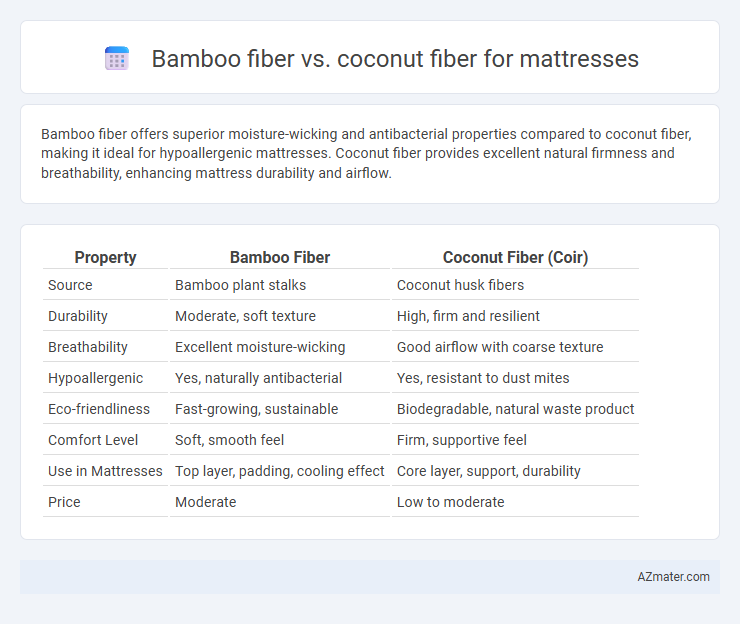Bamboo fiber offers superior moisture-wicking and antibacterial properties compared to coconut fiber, making it ideal for hypoallergenic mattresses. Coconut fiber provides excellent natural firmness and breathability, enhancing mattress durability and airflow.
Table of Comparison
| Property | Bamboo Fiber | Coconut Fiber (Coir) |
|---|---|---|
| Source | Bamboo plant stalks | Coconut husk fibers |
| Durability | Moderate, soft texture | High, firm and resilient |
| Breathability | Excellent moisture-wicking | Good airflow with coarse texture |
| Hypoallergenic | Yes, naturally antibacterial | Yes, resistant to dust mites |
| Eco-friendliness | Fast-growing, sustainable | Biodegradable, natural waste product |
| Comfort Level | Soft, smooth feel | Firm, supportive feel |
| Use in Mattresses | Top layer, padding, cooling effect | Core layer, support, durability |
| Price | Moderate | Low to moderate |
Introduction to Natural Mattress Fibers
Bamboo fiber and coconut fiber are two popular natural materials used in mattress manufacturing due to their eco-friendly and breathable properties. Bamboo fiber offers moisture-wicking and antimicrobial benefits, promoting a hygienic and comfortable sleep environment, while coconut fiber, derived from coir, provides firm support and excellent durability with natural resistance to mold and dust mites. Both fibers contribute to sustainable mattress design by reducing reliance on synthetic materials and enhancing overall sleep quality through their unique structural advantages.
What is Bamboo Fiber?
Bamboo fiber is a natural textile derived from the cellulose of bamboo plants, known for its softness, breathability, and antimicrobial properties, making it an ideal material for mattress covers and fillings. Compared to coconut fiber, or coir, which is coarse and firm, bamboo fiber offers superior moisture-wicking and temperature regulation, enhancing sleep comfort. Its eco-friendly cultivation and biodegradable nature contribute to sustainable mattress manufacturing in the bedding industry.
What is Coconut (Coir) Fiber?
Coconut fiber, also known as coir fiber, is a natural material extracted from the husk of coconuts and is widely used in mattresses for its durability and breathability. It offers excellent support and moisture resistance, making it an ideal choice for mattress padding and layers that enhance airflow and prevent mold growth. Compared to bamboo fiber, coir fiber provides firmer cushioning with natural resilience, contributing to a cooler and more supportive sleep surface.
Sustainability Comparison: Bamboo vs Coconut Fiber
Bamboo fiber and coconut fiber both offer sustainable options for mattress materials, with bamboo growing rapidly and requiring minimal water, pesticides, or fertilizers, making it highly eco-friendly. Coconut fiber, derived from coconut husks, utilizes agricultural waste and promotes waste reduction, but its processing consumes more energy compared to bamboo. Bamboo's fast renewability and low environmental impact give it an edge in sustainability, while coconut fiber excels in biodegradability and waste valorization.
Comfort and Support: Which Fiber Performs Better?
Bamboo fiber offers superior breathability and moisture-wicking properties, making it ideal for mattresses that prioritize comfort and temperature regulation. Coconut fiber, also known as coir, provides firmer support with excellent durability and natural ventilation, which benefits those seeking a sturdy mattress base. Combining bamboo and coconut fibers can balance softness and support, delivering optimal comfort and structural integrity for diverse sleeping preferences.
Durability and Longevity of Bamboo vs Coconut Mattresses
Bamboo fiber mattresses typically offer superior durability due to their natural resistance to wear, moisture, and bacteria, extending mattress longevity significantly. Coconut fiber mattresses, made from coir, provide robust firmness and resilience but tend to degrade faster under constant pressure and moisture exposure. The breathable, antimicrobial properties of bamboo contribute to maintaining mattress structure and comfort longer compared to the denser, less flexible coconut fiber material.
Breathability and Temperature Regulation
Bamboo fiber offers superior breathability and enhanced temperature regulation due to its moisture-wicking properties and natural air circulation, making it ideal for a cool sleep environment. Coconut fiber, while durable and resistant to mold, tends to retain more heat and provides less airflow, which can result in a warmer sleeping surface. Bamboo fiber mattresses excel in maintaining consistent comfort by effectively dissipating heat and moisture compared to coconut fiber alternatives.
Hypoallergenic Properties and Health Benefits
Bamboo fiber and coconut fiber both offer hypoallergenic properties ideal for mattress use, with bamboo fiber naturally resisting dust mites, mold, and bacteria due to its antimicrobial agents. Coconut fiber, derived from coir, provides excellent ventilation and moisture control, reducing allergens but may require treatment to enhance dust mite resistance. Both fibers contribute to healthier sleep environments by reducing allergen exposure and promoting breathability, though bamboo fiber tends to offer superior natural antimicrobial benefits.
Cost and Availability Analysis
Bamboo fiber mattresses typically offer a mid-range cost due to sustainable cultivation and advanced processing techniques, while coconut fiber mattresses tend to be more affordable owing to the widespread availability of coconut husks in tropical regions. Coconut fiber, also known as coir, is abundantly available in countries like India, the Philippines, and Indonesia, ensuring consistent supply and lower prices. Bamboo fiber production is growing but still limited compared to coir, which affects its overall cost and market availability in the mattress industry.
Which Fiber is Best for Your Mattress: Final Verdict
Bamboo fiber offers exceptional breathability and natural antimicrobial properties, making it ideal for a cool, hygienic mattress surface. Coconut fiber, known for its durability and firm support, enhances mattress resilience and promotes excellent airflow through its coarse texture. Choosing between bamboo and coconut fibers depends on whether you prioritize softness and moisture-wicking with bamboo, or firm support and longevity with coconut fiber for your mattress.

Infographic: Bamboo fiber vs Coconut fiber for Mattress
 azmater.com
azmater.com